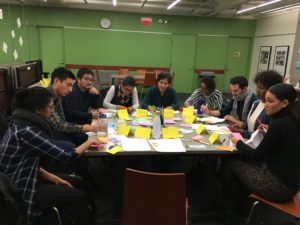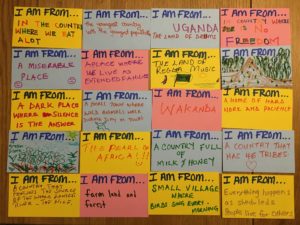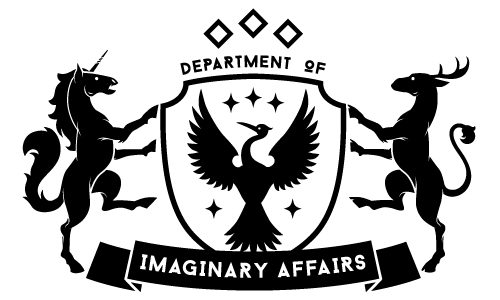Ooops. We missed a month! I can’t believe how fast March and April have zoomed by, not to mention the past 6 months. We are officially through “Year 1” of funding from IRCC and The Stories of Us project has grown and changed so much in that time. We have more than a few insights to share and I am going to do my best not to forget anything.

For this blog, I will focus on the workshops and for my next blog, I will focus on the outcomes of the Practitioners Gathering.
The Stories of Us project has provided continued learning around the idea of Expectations vs. Reality. This is a theme that Mathura has thoughtfully woven throughout The Stories of Us storytelling and writing workshops that I think very much echos what we are learning from the process as well.
We began this project with one simple hypothesis – the texts used to teach English in Canada should reflect the lives of newcomers and be helpful in their journeys of settling in Canada.
We focused on producing the storybooks that would be used in ESL classrooms.
We developed a simple process to get this done. We would engage with settlement and community organizations who have their own newcomer community and offer to host a 2-3 hour workshop with their clients. We would deliver a workshop to introduce the project and bring with us story writing workbooks to help participants write their story. Participants would write their stories in their home language and we would take those stories and have them translated into English.
Well, as you can imagine, it wasn’t as simple as we thought it would be. We ran into a few hiccups along the way.
Our initial process was designed to optimize for the production of storybooks. We figured that for every workshop we hosted, there would be 10 participants, and for every 10 participants we would get 10 stories. This seemed like simple mathematics and our outcome metrics reflected this.
Our initial process also assumed that settlement and community organizations would be more than happy to host our workshops. But what we found was that often these organizations are underfunded and/or stretched for time given their existing programs and deliverables.
These two basic assumptions have been the result of some major pivots in our work.

For starters, we found that there were two main categories for organizations who were teaching English – LINC classes and informal conversation circles. We found that LINC classes have their own curriculum and time wasn’t always on our side. We would get high levels of participation, but mostly because because it was presented as a class activity and students would feel at least some sense of obligation to participate, even if they had no desire to ultimately write their story or publish a book. Alternatively, organizations that hosted informal conversation circles weren’t always funded to host the groups. They were often doing this programming off the side of someone’s desk or organized by volunteers. So we found that getting organizations to agree to hosting workshops took a lot more explaining than we had initially assumed.
Once we got into a workshop, we began to see the shift from products to process and were able to appreciate the value of relationship-building throughout the story writing process.
Mathura is warm, welcoming, and at times vulnerable in her workshops and that lends itself well to helping the newcomers open up to tell their stories. We found that the simple idea of telling your story, one that you might be hiding or not proud of, is hard to contend with when you are used to putting on a brave face or feeling like no one cares about your story.
This resulted in us shifting away from a 2-3 hours one-off workshop to a series of six 2-3 hours workshops.
It was a big step to go from one workshop to six workshops. We did this for a few key reasons. We had received a lot of feedback about the challenges of the single workshop, and we wanted to make sure we were responding appropriately.
Participants needed time to work on their English, storytelling and writing during class. Outside of class, the rest of their lives are the priority. They need to take care of their kids, look for jobs, find doctors, etc.
Participants needed the time to heal and grieve. Storytelling and writing allowed participants to be emotional, to remember why they came to Canada, and to let them straddle being happy in their new home and missing their old home.
Participants needed time to build community and togetherness. Throughout the workshop series, participants were able to forge strong bonds with fellow participants through sharing stories that went beyond the basics of learning English side-by-side.

We shifted away from our initial focus on the books, and moved towards the relationships built with and between participants.
We have found this to be utterly rewarding for the participants and are making our way through the firsts of series now. Just this week, we wrapped up a series and received such heart-warming feedback, flowers and a cake!
We’ve learned that learning English isn’t as simple as we thought. We’ve learned that it’s important to experiment and to be wrong. We’ve learned to re-frame our thinking.
We haven’t got everything figured out yet. We are still going to be testing out our workshop series and refining as we go.
We also haven’t forgotten about some of the other pieces from where we began. We want to make sure these stories are accessible and digestible by large numbers of people. We initially wanted to have our stories accessible through the public library system. However, we have since learned that to get a proper ISBN number for a book is a bit of a gruelling process and we don’t have the resources to invest in that right now.
Of course, the stories will live on our website as a digital library. But we also want to make sure the stories are available in other forms. We haven’t completely decided how that will be. We have a few experiments coming in Year 2 for that one. We want to make sure that these stories are shared. So stay tuned!
We are applying for more funding to see if we can expand this work. We are keeping our fingers crossed.
